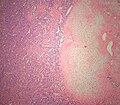Difference between revisions of "Mesenchymal chondrosarcoma"
Jump to navigation
Jump to search
| Line 50: | Line 50: | ||
*S100 (positive in chondrocytes not in small cells). | *S100 (positive in chondrocytes not in small cells). | ||
*Osteocalcin (negative in small cells). | *Osteocalcin (negative in small cells). | ||
*CD99 - (positive in small cells) | |||
==DDX== | ==DDX== | ||
Revision as of 11:27, 20 November 2014
Mesenchymal chondrosarcoma is a rare type of chondrosarcoma found in the soft tissue.
General
- Rare variant of chondrosarcoma.
- 2–10% of primary chondrosarcomas
- Adolescents and young adults
- Female predilection
- Most commonly intraosseous but can occur in extraskeletal sites especially the central nervous system (from the meminges)
- The 'mesenchymal' in the name refers to the ability to arise in soft tissues.[1]
- Conceptualized as originating from a pleuripotential mesenchymal cell with foci recapitulating enchondral ossification.
- The small cells appear to be an undifferentiated cartilage stem cell which “differentiate” into benign cartilage [2].
Gross
Pink and fleshy with foci of calcification.
Microscopic
'White clouds in a dark blue sky'
- Malignant tumor with a characteristic biphasic pattern
- Cellular poorly differentiated small round blue cells
- Can have a hemangiopericytomatous vascular pattern
- Islands of well-differentiated hyaline cartilage
- Progressive maturation of cartilage towards the center
- Central calcification or bone formation
Images
www:
- Mesenchymal chondrosarcoma (ouhsc.edu).
- Web Pathology - This example evokes hemangiopericytoma [1].
- Pathology Outlines - Another hemangiopericytomatous example [2]
- Sarcoma Images - [3]
- CNS Atlas - [4]
- CNS Atlas - [5]
- CNS Atlas - [6]
IHC
- SOX9 (positive in small cells and chondrocytes).[3]
- S100 (positive in chondrocytes not in small cells).
- Osteocalcin (negative in small cells).
- CD99 - (positive in small cells)
DDX
Depends a bit on where the tumor is located and how much cartilage is readily visible.
- Hemangiopericytoma - no cartilage
- Lymphoma - Sox9 negative, CD45 positive
- Metaplastic Glioblastoma - usually older adults - GFAP positive
- Chondrosarcoma - usually older adults - hyaline cartilage is malignant
- Small cell osteosarcoma - Sox10 negative, no cartilage
- Ewing sarcoma - Both are CD99 positive but ES is Sox9 negative, no cartilage
Molecular
t(8;8)(q21.1;q13.3) HEY1-NCOA2.[4]
See also
- Cartilage.
- Chondrosarcoma.
- Web Pathology[7]
- Pathology Oulines [8]
References
- ↑ Dowling EA (June 1964). "Mesenchymal chondrosarcoma". J Bone Joint Surg Am 46: 747–54. PMID 14161087. http://www.ejbjs.org/cgi/reprint/46/4/747.pdf.
- ↑ Fanburg-Smith, JC.; Auerbach, A.; Marwaha, JS.; Wang, Z.; Rushing, EJ. (May 2010). "Reappraisal of mesenchymal chondrosarcoma: novel morphologic observations of the hyaline cartilage and endochondral ossification and beta-catenin, Sox9, and osteocalcin immunostaining of 22 cases.". Hum Pathol 41 (5): 653-62. doi:10.1016/j.humpath.2009.11.006. PMID 20138330.
- ↑ Pang, ZG.; He, XZ.; Wu, LY.; Wei, W.; Liu, XY.; Liao, DY.; Li, FY.; Zhang, XL. (Jun 2011). "[Clinicopathologic and immunohistochemical study of 23 cases of mesenchymal chondrosarcoma].". Zhonghua Bing Li Xue Za Zhi 40 (6): 368-72. PMID 21914343.
- ↑ Panagopoulos, I.; Gorunova, L.; Bjerkehagen, B.; Boye, K.; Heim, S. (Jul 2014). "Chromosome aberrations and HEY1-NCOA2 fusion gene in a mesenchymal chondrosarcoma.". Oncol Rep 32 (1): 40-4. doi:10.3892/or.2014.3180. PMID 24839999.






